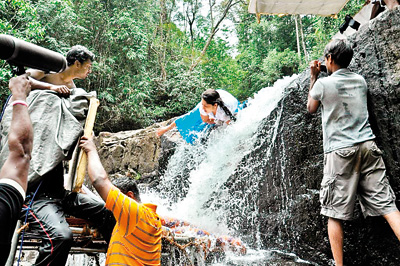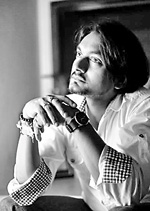Raising the bar for the local cinema industry
 Young director Daevinda Kongahage’s debut movie, ‘Bhavatharna’ (Crossing Sansara) was adjudged the Best Film at the 2015 Delhi International Film Festival recently and ushered in a new era in the local cinema industry.
Young director Daevinda Kongahage’s debut movie, ‘Bhavatharna’ (Crossing Sansara) was adjudged the Best Film at the 2015 Delhi International Film Festival recently and ushered in a new era in the local cinema industry.
Born in Colombo he spent his time between Colombo and Kandy. A Trinitian and a Royalist, Kongahage was exposed to both politics and artsfrom his childhood due to the influence of his mother Suvineetha Weerasinghe and father Sarath Kongahage.
He was as young as five years old, when he witnessed the political discussions and decision making that took place within the home. Having accompanied his father into political meetings, he gained insight into political ideas, theories and attitudes. While his mother’s influence opened up the path for him to familarise himself with various components of cinema- from being in the presence of actors, directors, producers, camera crews and production teams to seeing how shooting and creation of films and dramas take place. “Familiarity with these aspects have always pushed me to look beyond what I see from the surface. As a child seeing the cameras or actors performing was normal for me. So I always wanted to find something beyond what I see,” says Daevinda.

Photos courtesy Bhavatharna photo team
The film is inspired by Prof. Devaraja’s “The Kandyan Kingdom.” The story revolves around an untold chapter of history during the Kandyan kingdom, under King Keerthi Sri Rajasingha’s rule, where a few aristocrats plotted against the king.
“When I found similar contexts highlighted in Prof. Lorna Devaraja’s, work to what I’ve experienced, especially because I belonged to a generation which witnessed a lot of social conflicts in the 80s, I wanted to dig deeper into the Kandyan Kingdom. When I did, I saw many sides in that. So I wrote the script in a way that society could see the film in different perspectives,” he says about the film.
He began his film career as a child artist at the age of 11. He was chosen by renowned film director and writer, Dharmasiri Bandaranayake to act in his last two films “Bhavaduka” and “Bhavakarma.”
“Seeing the entire production and working with Dharasiri Bandaranayake, I was motivated to be a creator than an actor. It made me realize that, by becoming a creator, I would be able to talk to each and every social context,” he says.
Learning cinema, which was a part of his life since his childhood became a more serious process thereafter. In the absence of an institutional background, which he says still is a pressing need, Daevinda learnt the subject through hands on training.
Daevinda who subsequently worked in a TV series done by his mother as an Assistant Director, joined the Maharaja Group as an Assistant Producer following the completion of his higher education in Management. There, he was groomed to become a very versatile producer, before he started out on his own.

Filming on set
Daevinda who has directed a documentary on Sir Arthur C. Clarke for his 85th birthday, was also the creative director and concept developer of the show Ranaviru Real Star season one. He was also the first creative director of Music Mega Star – the first American Idol inspired super star concert in Sri Lanka.
Asked whether crossing the nexus between religion and politics was a challenge, he says rather than a challenge he had a lot of thinking to do as to how to put the storyline across in a way that individuals, clergy or politicians would not misinterpret it. Hence scripting took long, he says.
The financial aspect posed another challenge. With a lengthy production period comprising 158 days of shooting, one year pre-production period and another one and half year post production period in addition to the two years spent on research and script writing, the finance component became tough.
Elaborating on the importance of the research component in cinema, Daevinda says without research, cinema would not exist.
“Whatever the subject you deal with, research is vital. Even if it is a simple love story, we should research into human instinct, human behavior, body language, etc. Otherwise what you create will not become unique to the audience,” he says adding that “Bhavatharna” required extensive research as the subject matter was historical and that he had to depict the exact details of the Kandyan Kingdom in a way that is not exaggerated and over done. Even creating the magnitude of the castle was done by researching into historical architecture, he explains.

Daevinda Kongahage
“Doing a film is not just writing a script and showing it to the public. Sri Lanka should consider this beyond entertainment.Sri Lanka is trying to do more blockbuster movies but there are so many other stages that we need to develop before that. We are only interested in developing technical aspects in relation to a movie targeting blockbuster standards. But there are so many other things that needs to be done on the subject of cinema properly. This is where the formal education comes into play. Cinema should be done with proper education,” Daevida adds.
A visionary film maker who works hard to raise the bar of the local cinema industry, his ambition is to establish a formal institution for cinema related learning to take place.
His idea is to establish a film making institute of international standards in Sri Lanka, which can groom fully fledged creators in the industry of cinema. Meanwhile for the next generation of filmmakers, he feels it is important that they become critical viewers first before becoming creators, he says adding that it is important to be flexible, open-minded, educated and think out of the box.
“You should not be limited to demarcations or restrict yourself for political religious narrow mindedness,” he adds.


